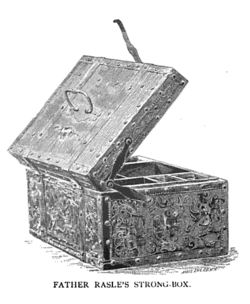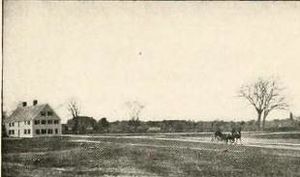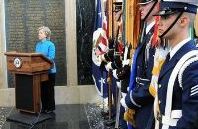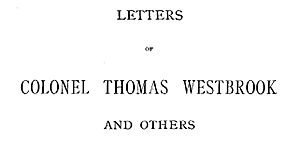Thomas Westbrook facts for kids
Quick facts for kids
Thomas Westbrook
|
|
|---|---|

Westbrook retrieved Father Rale's strong box
|
|
| Born | 1675 |
| Died | 11 February 1743/1744 (age 69) |
| Occupation | Commander in the "East", Colonel of militia, King's mast agent, councilor, mill owner, speculator, innkeeper |
| Spouse(s) | Mary Sherburne |
| Children | 1 |
| Military career | |
| Allegiance | British America |
| Rank | Major |
| Battles/wars | Queen Anne's War Father Rale's War |
| Signature | |
Colonel Thomas Westbrook (1675–1743/44) was an important military officer in Maine during a conflict known as Father Rale's War. He was more than just a soldier. He also worked as a scout, a government advisor, an inn owner, and a mill owner. He even helped the King get wood for ships. The town of Westbrook, Maine is named after him.
Contents
Early Life and Work
Thomas Westbrook was born in 1675. During an early war called Queen Anne's War, he became a ranger in a small group of soldiers in 1704.
Later, in 1716, the government gave him permission to run the only public inn in a place called the Plains. He also had to set aside land for the local soldiers to practice. He owned and ran this inn from at least 1720.
Role in Father Rale's War
Between 1721 and 1723, Westbrook became a captain in the local army, called the militia. He later became a colonel, which is a very high rank. He was put in charge of the militia in the "East," which was the area we now know as Maine.
During Father Rale's War, a main goal for the New Englanders was to capture Father Sebastien Rale. He was a French priest living with Native American tribes. The New Englanders believed he was encouraging the tribes to attack their settlements. In December 1721, the government ordered the militia to arrest Father Rale.
The Strong Box Discovery
In January 1722, Colonel Westbrook led a group of militia soldiers. They couldn't find Father Rale, but they did find and take a strongbox. This box held letters between Father Rale and the French Governor in Quebec. It also had a dictionary of the Abenaki language, written by hand.
The New Englanders believed these letters proved that the French were helping Native American tribes attack their towns. The letters were sent to officials in Boston.
Colonel Westbrook was also present at the peace treaty in Falmouth on December 15, 1725. This treaty, called "Dummer's Treaty," ended the fighting. This was likely his last official duty as a militia officer.
Life in Falmouth, Maine
Westbrook moved to Falmouth (which is now Portland, Maine) around 1719. He wanted to get into the profitable business of supplying tall trees, called masts, to the British navy. He was one of the first European settlers in that area at the time.
In 1727, he was appointed the King's Mast Agent. This meant he was in charge of finding, protecting, and providing trees suitable for the Royal Navy's ships. He moved this important business from Portsmouth to Falmouth.
Westbrook became an official resident of Falmouth in August 1727. He built a large home called "Harrow House" on a 69-acre property. It was likely at this home that he hosted important guests, including Governor Jonathan Belcher.
He also built two mills: a gristmill for grinding grain and a papermill. However, a Native American chief named Chief Polin complained to the governor. He said that Colonel Westbrook's mill was blocking fish from swimming upstream to lay their eggs.
Serving as a Councilor
As early as 1710, Thomas Westbrook was part of the King's Council. This was a group of advisors appointed by the governor. He held this position until 1730, when he chose to step down. In 1733, he briefly served as a representative for Falmouth in Boston. He didn't show much interest in these duties and was sometimes fined for being absent.
Business Ventures
Thomas Westbrook partnered with Brigadier General Samuel Waldo. Together, they bought and sold large amounts of land, about 15,000 acres, near Falmouth. They were successful for a while. However, Waldo later took advantage of Westbrook, causing him to lose much of his land and wealth by 1743.
In 1743, Waldo won a court case against Westbrook, which led to Westbrook losing almost all his property. A letter from Westbrook, written in 1740, shows how desperate he was for money.
July 29, 1740.
Sir my desterse is so grat I know not how to Turn myself for Want of money. If you cold any Ways helpe me I shall tack it as a favor. Mr. Robrds is going to Portsmouth, and I want to send sum money to Plastd. Pray consider the hard case of your frind and sarvant ... THO. WESTBROOK.
Later Years and Passing
Thomas Westbrook passed away on February 11, 1743/1744. He had faced significant financial difficulties. He died in a smaller house next to his beloved Harrow House, which he had lost to his creditors. Even though he had lost much, his remaining property was still valued at a good amount.
His family had to secretly move his body during a snowstorm at night. They did this to prevent his creditors from taking his remains until his debts were paid. For a long time, his burial place was a secret, known only to his sister's family. In 1976, his gravesite was found at Smiling Hill Farm. It has since been marked by a historical society.
Family Life
Thomas Westbrook was born in 1675 to John Westbrook and Martha Walford in Portsmouth, New Hampshire. His sister, Mary, married Nathan Knight. Her family still owns and runs the "Smiling Hill" farm today.
Thomas married Mary Sherburne. Her family's restored home, the Sherburne house in Portsmouth, New Hampshire, is now a historical site. Thomas and Mary had one child, a daughter named Elizabeth. She married Richard Waldron (Secretary), who came from an important family in colonial New Hampshire.
Even though Thomas Westbrook didn't have any sons, several of his descendants were named "Thomas Westbrook Waldron." One of his great-great-grandsons, also named Thomas Westbrook Waldron, was a US consul. In 2009, then-Secretary of State Hillary Clinton honored him in a ceremony. The names "Thomas Westbrook" or just "Westbrook" continued to be used as first names in his family for many years.
Lasting Impact
In 1814, the town of Stroudwater was created from Falmouth. Just a few months later, the town was renamed Westbrook, Maine to honor the Colonel. It was a member of the Knight family, descendants of Westbrook's sister, who suggested naming the town after him.
His reports about his work as a military officer were published in a book called Letters of Colonel Thomas Westbrook and others relative to Indian affairs in Maine, 1722-1726. This book is often used by historians as an important source of information about that time.
 | Selma Burke |
 | Pauline Powell Burns |
 | Frederick J. Brown |
 | Robert Blackburn |




